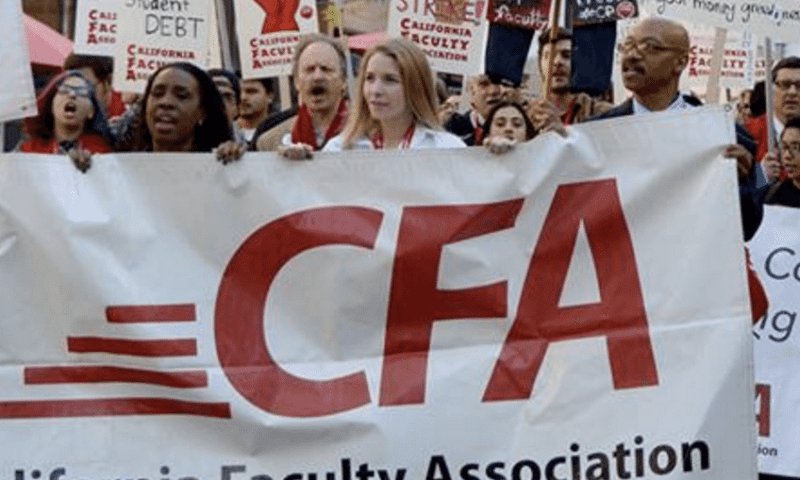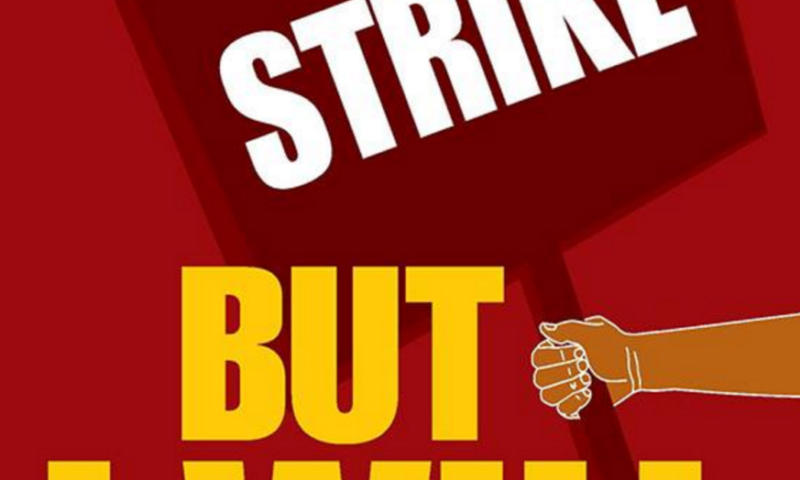

California is often perceived politically as a sea of solid “blue” – a state, with its Democratic governor and Democratic-controlled legislature, that has become synonymous with progress.


A few weeks ago, I found myself with tears in my eyes and a lump in my throat. Before me almost a thousand janitors wearing deep purple Service Employee International Union T-shirts lined up to march from a Beverly Hills park to the high-rise offices of Century City.


April 1 was a historic day for public education in the U.S. Joined by diverse community groups and other workers, Chicago’s public school teachers took to the streets demanding more from city and state leaders.


This afternoon both sides currently engaged in contract talks announced a tentative accord that will postpone a threatened strike by the 26,000-member California Faculty Association.


Members of the 26,000-strong California Faculty Association (CFA) are threatening to carry out their first system-wide, simultaneous strike in the event contract talks with the California State University administration (CSU) reach a stalemate.


Most high school science teachers across the country now teach climate change, but about a third explain it away as a natural phenomenon. Another third tell their students that it comes from both natural and human causes. Meanwhile California almost reached its average reservoir and snowpack levels as measured at the end of March, and reports from around the world say that the oceans keep rising faster than expected and that annual temperatures continue go up. Last year finished as the hottest yet, following a decade of record-breaking annual tallies.
As if this weren’t happening, the fossil fuel folks keep pressing ahead. Our state’s three major privately-owned utility companies filed applications for a rehearing at the Public Utilities Commission, seeking a rollback of its recent rules encouraging rooftop solar panels. The big guys never give up.
So is there any good news this spring?
» Read more about: Spring Awakening: Uniting Against Climate Change »


Deanna Dunagan and Seamus Mulcahy (Photo: Kevin Parry/Wallis Annenberg Center)
Jesse Eisenberg has carved a film career playing irritating nebbish-antiheroes in a host of roles. He even earned an Oscar nomination for best actor in the most memorable of these, as Facebook founder Mark Zuckerberg in The Social Network. But his artistic ambitions also encompass writing for the stage, and his second play, The Revisionist, opens with an engaging premise, albeit an unfulfilled one.
David (Seamus Mulcahy), a young American writer wrestling with a book revision, comes to Poland to visit a distant, aged cousin, Maria (Deanna Dunagan), a Holocaust survivor. Unfortunately, the two have very different notions of how David will spend his journey. Maria, a crimped pensioner who fills her lonely days watching CNN (to help with her English), envisions a chance to connect with a far-flung relative,


Immigration has never been more in the national spotlight, with Republican presidential candidates histrionically claiming most of those who cross the Mexican border are rapists and murderers, while calling for everything from mass deportations to the building of a massive wall with Mexico. Politicians and citizens are also debating how best to deal with Syrian refugees fleeing their war-torn country.
But there’s a border story the majority of Americans are not hearing about.
Over the last two years, more than 100,000 unaccompanied minors — from those under 18 years old to as young as 6 — have crossed the border trying to escape the violence that plagues their home countries of El Salvador, Honduras and Guatemala. You won’t find this mass exodus mentioned in stump speeches or discussed by pundits on the 24/7 news channels.
Herself the daughter of Cuban refugees, CalArts teacher/playwright Marissa Chibas is trying to do something about that.


The placards stacked outside the Ronald Reagan State Building said it all: “We Did It!” The hundreds of low-income workers who had just carried those signs had come to downtown Los Angeles Monday morning to celebrate “it” – the passage of a $15 an hour state minimum wage. The mood was jubilant, almost delirious, in anticipation of Governor Jerry Brown’s arrival to sign the measure, known as Senate Bill 3.
To be clear: The new wage law does not mean fast-food workers, janitors, in-home caregivers or others are about to jump from earning $10 an hour to $15. Come January 1, 2017, people earning the current minimum wage will move to a $10.50 hourly wage. The following January, it will go up to $11, not reaching $15 until 2022 (2023 for workers employed in companies with 25 or fewer workers). But along the way, workers who previously had to get sick on their own time will be given three paid days off – a big boost for their health and the well-being of both the people they work with and serve.
» Read more about: Sweet 15: Governor Signs $15 an Hour Minimum Wage Bill »


Remember when maggots were found in potatoes about to be served at a Michigan prison? That was just the tip of the iceberg.
A new report released this week details widespread cost-cutting by the food service company Aramark, whose contract was terminated by that state last year. Kitchens were not only unsanitary but dangerous. The company hired inexperienced staff, allowing prisoners to steal makeshift weapons and control the lunch line. Food shortages were especially common.
Michigan eventually replaced Aramark with a new contractor, but the report comes to an unambiguous conclusion: The underlying problems that ended the contract are “likely to resurface under any contract relationship.”
This is because, in a drive for profits, private corrections companies like Aramark routinely cut corners to lower costs. In private prisons, this drive often leads to more prison violence, lawsuits and staff turnover.
» Read more about: Hell’s Kitchens: Privatized Prison Mess Halls »